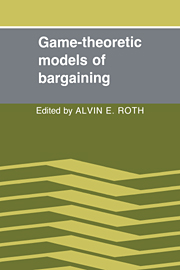Book contents
- Frontmatter
- Contents
- List of contributors
- Preface
- Chapter 1 Editor's introduction and overview
- Chapter 2 Disagreement in bargaining: Models with incomplete information
- Chapter 3 Reputations in games and markets
- Chapter 4 An approach to some noncooperative game situations with special attention to bargaining
- Chapter 5 Infinite-horizon models of bargaining with one-sided incomplete information
- Chapter 6 Choice of conjectures in a bargaining game with incomplete information
- Chapter 7 Analysis of two bargaining problems with incomplete information
- Chapter 8 Sequential bargaining mechanisms
- Chapter 9 The role of risk aversion in a simple bargaining model
- Chapter 10 Risk sensitivity and related properties for bargaining solutions
- Chapter 11 Axiomatic theory of bargaining with a variable population: A survey of recent results
- Chapter 12 Toward a focal-point theory of bargaining
- Chapter 13 Bargaining and coalitions
- Chapter 14 Axiomatic approaches to coalitional bargaining
- Chapter 15 A comment on the Coase theorem
- Chapter 16 Disclosure of evidence and resolution of disputes: Who should bear the burden of proof?
- Chapter 17 The role of arbitration and the theory of incentives
Chapter 7 - Analysis of two bargaining problems with incomplete information
Published online by Cambridge University Press: 23 September 2009
- Frontmatter
- Contents
- List of contributors
- Preface
- Chapter 1 Editor's introduction and overview
- Chapter 2 Disagreement in bargaining: Models with incomplete information
- Chapter 3 Reputations in games and markets
- Chapter 4 An approach to some noncooperative game situations with special attention to bargaining
- Chapter 5 Infinite-horizon models of bargaining with one-sided incomplete information
- Chapter 6 Choice of conjectures in a bargaining game with incomplete information
- Chapter 7 Analysis of two bargaining problems with incomplete information
- Chapter 8 Sequential bargaining mechanisms
- Chapter 9 The role of risk aversion in a simple bargaining model
- Chapter 10 Risk sensitivity and related properties for bargaining solutions
- Chapter 11 Axiomatic theory of bargaining with a variable population: A survey of recent results
- Chapter 12 Toward a focal-point theory of bargaining
- Chapter 13 Bargaining and coalitions
- Chapter 14 Axiomatic approaches to coalitional bargaining
- Chapter 15 A comment on the Coase theorem
- Chapter 16 Disclosure of evidence and resolution of disputes: Who should bear the burden of proof?
- Chapter 17 The role of arbitration and the theory of incentives
Summary
Introduction
In analyzing a cooperative game with incomplete information, three kinds of solution concepts should be considered. First, we should characterize the set of coordination mechanisms or decision rules that are feasible for the players when they cooperate, taking account of the incentive constraints that arise because the players cannot always trust each other. Second, we should characterize the mechanisms that are efficient within this feasible set. Efficiency criteria for games with incomplete information have been discussed in detail by Holmström and Myerson (1983). Third, we should try to identify equitable mechanisms on the efficient frontier that are likely to actually be implemented by the players if they are sophisticated negotiators with equal bargaining ability. (We might also want to consider cases where one player has more bargaining ability than the others, as in principal – agent problems.) For this analysis, a concept of neutral bargaining solution has been axiomatically derived by Myerson (1983, 1984).
In this chapter, two bilateral trading problems with incomplete information are analyzed in terms of these three solution concepts. Sections 7.2 through 7.4 consider the symmetric uniform trading problem, a simple problem in which the buyer and seller each have private information about how much the object being traded is worth to him. This problem was first studied by Chatterjee and Samuelson (1983), and was also considered by Myerson and Satterthwaite (1983).
- Type
- Chapter
- Information
- Game-Theoretic Models of Bargaining , pp. 115 - 148Publisher: Cambridge University PressPrint publication year: 1985
- 24
- Cited by



